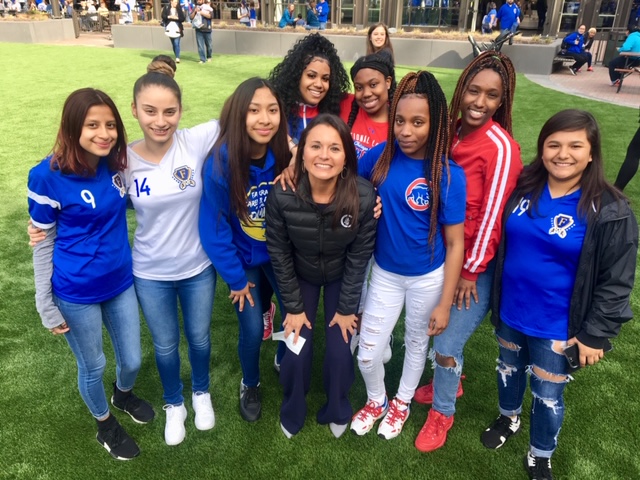Somewhere among the long line of cars outside Wrigley Field is a masked figure, helping Spanish-speaking families pick up boxes of produce, meat and other wholesome food. Not just another volunteer, this is Alicia Gonzalez, a hero of the sports nonprofit world, who started her first organization to help people while she was still in high school, and who has long worked to leverage the power of sports to build community and help others.
Now that players are sidelined and so many fans are struggling, Gonzalez’ work has come front and center. Besides converting Wrigley Field into a massive distribution site for Lakeview Pantry, the Cubs, Cubs Charities and individual team members have been busy helping their community in myriad ways. Stars including Anthony Rizzo, Jason Heyward, Kyle Schwarber and Javy Báez have donated cash, meals, PPE and more.
Cubs Charities, the team’s charitable arm, has given $1.3 million to COVID-19 relief efforts, including donations to the Chicago Community COVID-19 Response Fund, Illinois COVID-19 Response Fund, the Greater Chicago Food Depository and Lakeview Pantry. The Cubs hosted two blood drives for the Red Cross at the American Airlines Conference Center next to Wrigley Field, and has delivered hundreds of meals from Lakeview restaurants to community hospitals, first responders and homeless shelters.
At the same time, Cubs Charities have continued supporting community members they work with regularly, who suddenly find themselves with changing needs during the crisis.
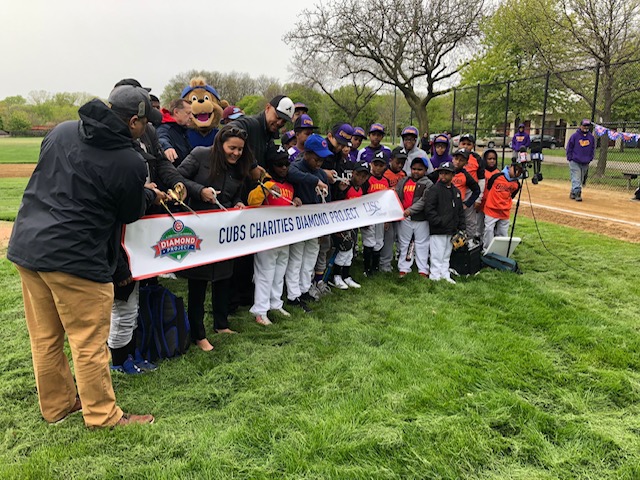
How did you end up running the Cubs’ charitable organization?
I grew up in Pilsen and Little Italy. Social justice was infused in my veins even as a baby. My mother and father were big activists. When I was 14, I had the privilege of switching from public school to private school on the North Side, and really saw the inequities in the city. Coming to Lincoln Park I was like, wow, look at all the resources this community has!
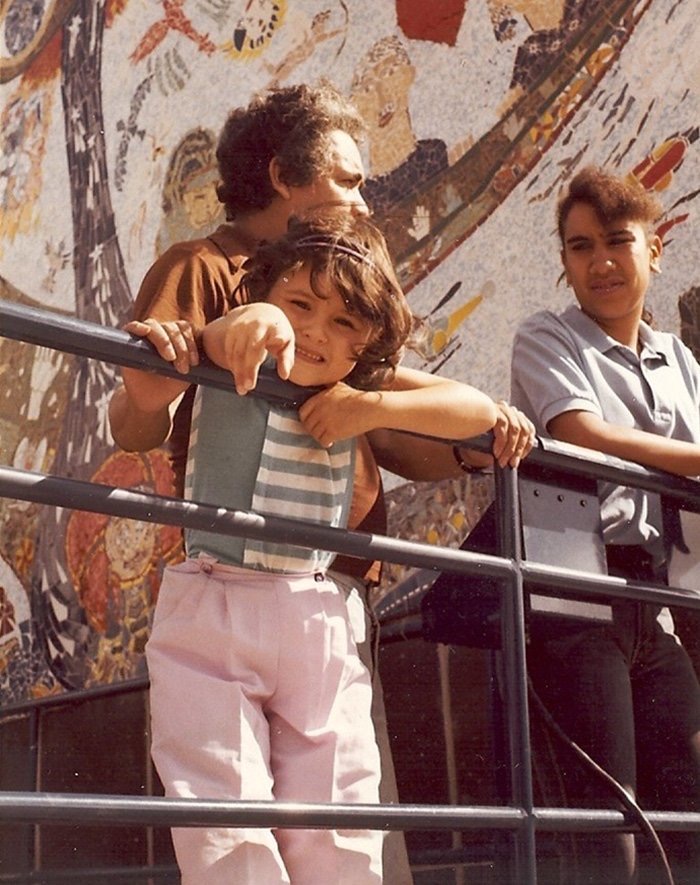
At a very young age I was impacted by the AIDS epidemic from a family member who had passed away. Going to school in Lincoln Park, I started going up and down Belmont and Broadway and asking the AIDS organizations what kind help they needed from a 15-year-old. It transformed into me starting a citywide youth AIDS action committee through my high school. We had youth from all over that were either volunteering at AIDS organizations, fundraising for AIDS, or doing peer education.
Sport had always been a huge part of my life. I was a big runner. When I went off to college I knew that I wanted to be able to eventually utilize sport to help with mental health and to help with healing. After college I worked in nonprofits and community organizing and, later, for a local bank setting up charitable initiatives.
I saw the incredible need in our community for more quality sports programs that emphasized mental health. I wanted to start my own running-related nonprofit. I found out the Pritzker Traubert Foundation was looking for a founding executive director to start a running nonprofit and I got the job. They gave me a laptop and a cell phone, so I worked out of Panera Bread for the first two months, and launched this organization, Chicago Run. I had a 10-week pilot program with 2,000 kids in 12 schools, and I had no staff. I was breathing, eating, sleeping Chicago Run. By the time I left 10 years later, we were serving almost 20,000 kids in 55 schools and the Cook county juvenile detention center.
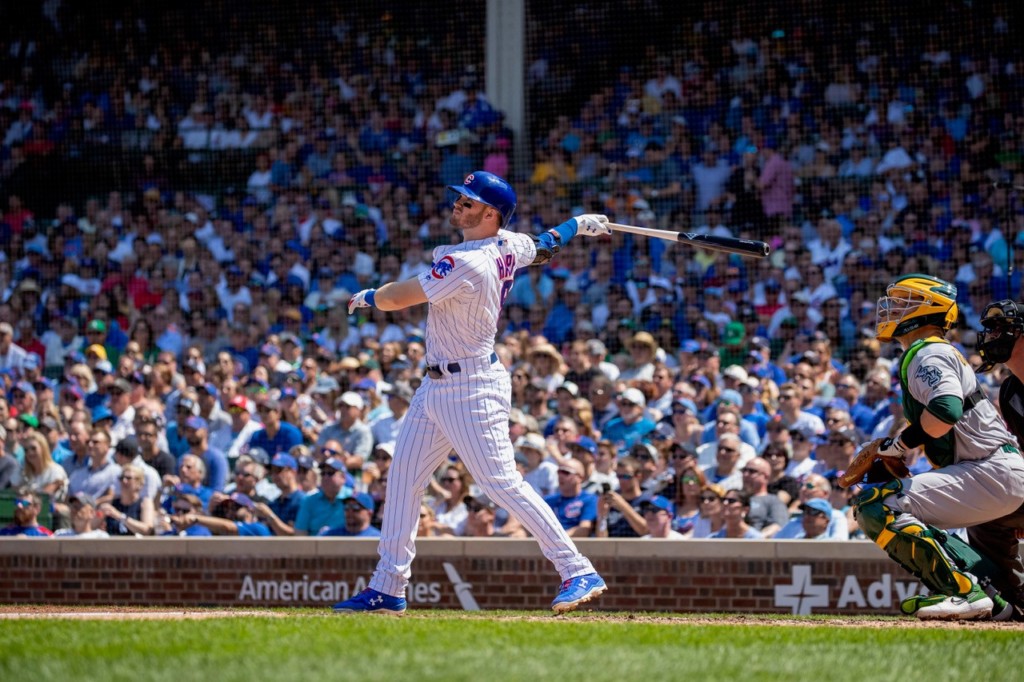
I came over to Cubs Charities because they were starting to be more intentional about their sport for youth programming, and I wanted to come over to help elevate that. That was two years ago.
So what’s it like working a food pantry out of a special place like Wrigley Field?
It’s been incredible. It’s the Friendly Confines, right? It represents hope and community. Sport brings people together. While we can’t be playing baseball right now, when you walk in and see all the volunteers, while we all have to be physically distanced from each other, there is a sense of unity and a real sense of service and compassion.
Did you have to make a lot of changes at Wrigley in order to convert it to a food packaging and distribution site?
We didn’t really have to do much, just open our doors and open our hearts.
It was a perfect fit for what the Lakeview Food Pantry needed. We have the forklift. We have the space in the concourse for people to be 6 feet apart. We have the ability to have a line wrapped around the ballpark because we have that when we have games.
How have the usual Cubs Charities’ programs changed as a result of the COVID crisis?
The majority of our charity work is based in sport youth development: utilizing sport for physical health and mental health. So we had to pivot significantly when COVID hit. We have quite a few Cubs Scholars in college. Starting in their senior year of high school, we give them a ton of support, college persistence and college prep. Then we follow them through their four years of college and provide a $5,000 scholarship for them every year.
All of them are from low income neighborhoods. Many of them had to leave college right away and did not have the means to get home. We provided immediate relief to them, mainly through gift cards so they could convert that to cash and get home. Many of our students have few resources in terms of technology, and when everything went to virtual learning, we knew we were going to have to increase their technological resources.
Every spring we choose a new cohort of eight Cubs Scholars. This year because we had to pivot to the virtual world, we weren’t able to do our interviews in person, so we did interviews via Zoom. When they are selected, normally we surprise them and go to their school with (mascot) Clark the Cub. This year we had them all on a Zoom, and had (Cubs sportscaster) Len Kasper surprise them.
You’re in contact with people every day who are struggling like never before. How do you keep going?
There are moments when I am just in tears at how decimated some of our neighborhoods are right now. At the same time I also have these tears of joy, because I’m seeing the best of humanity. I’m seeing people really roll up their sleeves and help in any way they can.
When the rebuilding happens there is going to be a lot of healing that needs to be done. I hope that the sport will bring back some of the hope and inspiration.
More from Better:
- In the Time of COVID, Drive-Thru Graduation is Short, But Definitely Sweet
- Bummed the Olympics Aren’t Happening This Summer? Here’s How to Have Your Own Around Chicago
- 7 Top Apps to Identify Plants
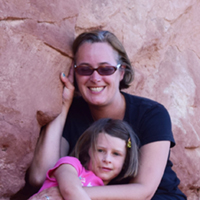 Carrie Kirby spends a lot of time asking people about something they think about but rarely talk about: money. Her work on personal finance, business and technology has appeared in San Francisco Magazine, Consumers Digest, Wise Bread and more publications. Carrie’s most recent work about her other love, travel, appears in The Best Women’s Travel Writing: Volume 10. She lives on an island (Alameda) with her husband and three kids, and blogs about getting them all where they need to go without owning a car at carfreemom.com.
Carrie Kirby spends a lot of time asking people about something they think about but rarely talk about: money. Her work on personal finance, business and technology has appeared in San Francisco Magazine, Consumers Digest, Wise Bread and more publications. Carrie’s most recent work about her other love, travel, appears in The Best Women’s Travel Writing: Volume 10. She lives on an island (Alameda) with her husband and three kids, and blogs about getting them all where they need to go without owning a car at carfreemom.com.
